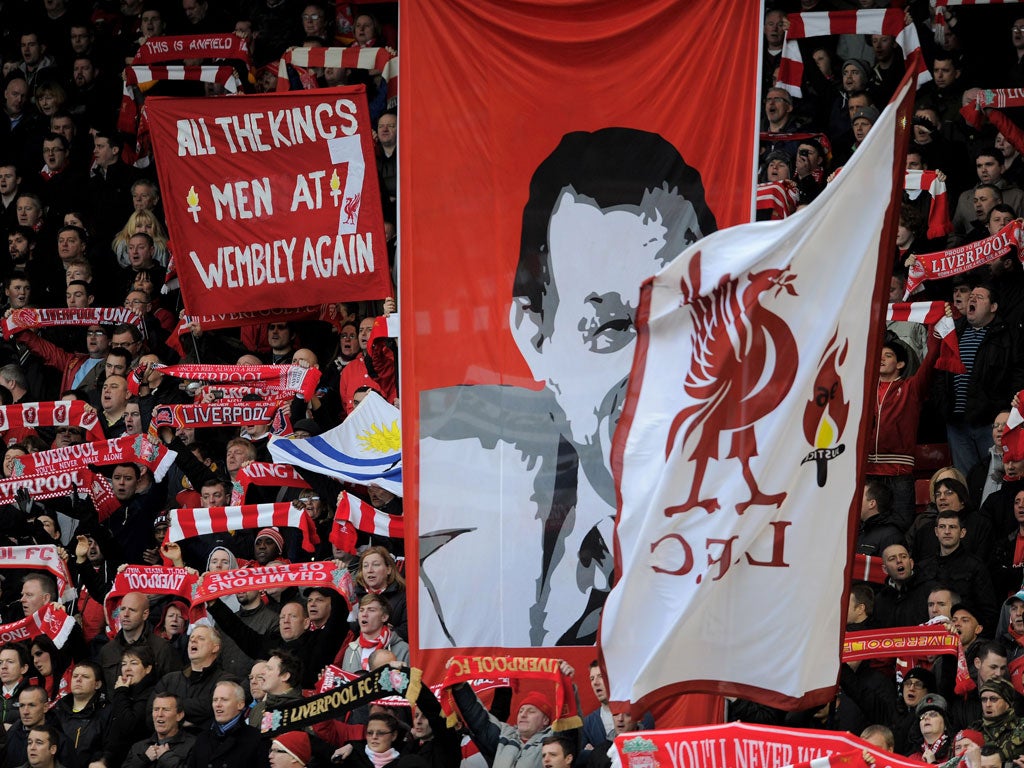Your support helps us to tell the story
From reproductive rights to climate change to Big Tech, The Independent is on the ground when the story is developing. Whether it's investigating the financials of Elon Musk's pro-Trump PAC or producing our latest documentary, 'The A Word', which shines a light on the American women fighting for reproductive rights, we know how important it is to parse out the facts from the messaging.
At such a critical moment in US history, we need reporters on the ground. Your donation allows us to keep sending journalists to speak to both sides of the story.
The Independent is trusted by Americans across the entire political spectrum. And unlike many other quality news outlets, we choose not to lock Americans out of our reporting and analysis with paywalls. We believe quality journalism should be available to everyone, paid for by those who can afford it.
Your support makes all the difference.When last season Kenny Dalglish said that kit deals were now as important to Liverpool as victories, it seemed ridiculous for someone brought up on the Anfield mantra of "first is first, second is nowhere". In fact, Dalglish was merely echoing the thoughts of the men who now own the club.
Viewed from the narrow piece of history that is Anfield, Old Trafford, with its array of executive boxes which help Manchester United to bring in £2.2 million more than Liverpool at every home game, must seem like the Death Star.
Whatever the result of this afternoon's encounter, the question is whether the battle for the long term between these clubs has already been decided?
We asked the football finance expert, Kieron O'Connor, whose blog "The Swiss Ramble" is now required reading, to analyse these figures to determine if, financially, there is a way back for Liverpool.
Total revenue: 2010-11
Liverpool £184m
Manchester United £331m
Liverpool's revenue was significantly behind Manchester United's in 2010-11, the last season where every club published accounts. Last week United announced their 2011-12 results with revenue 3 per cent down at £320m, largely due to their earlier elimination from the Champions' League, but it still dwarfs Liverpool.
If we look at the three main revenue streams, we can see how difficult it would be for Liverpool to regain parity:
Match Days
Liverpool £41m
Manchester United £111m (2010-11)
United's 2011-12 match-day revenues decreased to £99m, mainly as a result of four fewer home games compared with last season, when they also received a share of the gate receipts from the Champions' League final and FA Cup semi-final.
Nevertheless, this is still more than double Liverpool's match-day revenue, which could only be addressed by Fenway Sports Group building a new stadium or renovating Anfield. Naming rights might also help bridge the gap.
Broadcasting
Liverpool £65m
Manchester United £117m (2010-11)
United's 2011-12 broadcasting revenues fell to £104m, mainly due to the elimination at the group stages of the Champions' League.
Qualifying for Europe's flagship tournament makes a huge difference, because the central distributions for the Premier League are fairly equitable. In 2011-12 United received £60m after finishing second; Liverpool received £54m for coming eighth. In 2010-11, when they reached the Champions League final against Barcelona, United received £47m in TV distributions alone. The Europa League will only make a small difference to Liverpool's finances.
Commercial
Liverpool £77m
Manchester United £103m (2010-11)
Liverpool have done well here, increasing commercial income by 25 per cent in 2010-11, largely due to their shirt sponsorship rising from £12.5m with Carlsberg to £20m with Standard Chartered, and they have the £25m Warrior kit-supplier deal on the way, more than twice the amount received from adidas. United's 2011-12 income climbed 14 per cent to £118m, largely thanks to new secondary sponsors, including the amazing £10m DHL training-kit agreement. They switched main shirt sponsor from AIG to Aon in 2010-11, raising the annual value from £14m to £20m, but have announced a deal with Chevrolet, which will rise to an astonishing £45m in 2014-15. In addition the sponsor will pay them £11m in each of the previous two seasons, while Aon are still the sponsors.
Kit supplier Nike paid about £26m last year (plus a 50 per cent share of profits from the club's merchandising, licensing and retail operations). It is said they will go for an annual rise of at least £10m.

Join our commenting forum
Join thought-provoking conversations, follow other Independent readers and see their replies
Comments